The Trump administration is engaged in secret negotiations with Diosdado Cabello, the head of Venezuela’s socialist party, The Associated Press reported Monday, as members of President Nicolás Maduro’s administration seek guarantees of not being prosecuted if they remove the embattled leader. Cabello is considered the second most powerful man in Venezuela after Maduro, The Hill reports.
‘Scorpions in a bottle’
Mr Cabello is believed to want to lead Chavista forces in any future elections, which poses problems for a US administration that has publicly denounced him as a drug trafficker, a money launderer and an embezzler, The FT adds:
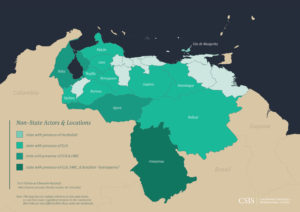
CSIS
Instead, Washington is hoping that Mr Maduro’s government will crumble amid internal divisions. John Bolton, Mr Trump’s national security adviser, has compared the key figures in the regime to “scorpions in a bottle, staring each other down, waiting to see who stings first”. But after so many false dawns for opposition hopes in Venezuela, observers are cautious.
“It could be hyperactive paralysis,” said Nicholas Watson, who leads Latin America political risk coverage for consultancy firm Teneo. “Lots of parts moving but nothing is actually happening.”
Observers of Venezuelan politics greeted the reports – apparently designed to destabilize Maduro’s crisis-stricken administration by stoking paranoia within his inner-circle – with scepticism, The Guardian reports.
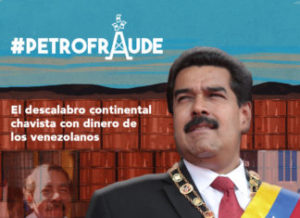 “I think what the US is trying to do is some sort of psy ops thing,trying to rattle people within Maduro’s administration,” said Christopher Sabatini,* a senior fellow for Latin America at the Chatham House thinktank.
“I think what the US is trying to do is some sort of psy ops thing,trying to rattle people within Maduro’s administration,” said Christopher Sabatini,* a senior fellow for Latin America at the Chatham House thinktank.
U.S. involvement could be critical in breaking the months-long stalemate but the Trump administration nonetheless should be careful not to overstep the delicate boundaries at play, said Michael Shifter,* president of the Inter-American Dialogue.
“The U.S. has not only an opportunity, but a responsibility, to use leverage it has to try and advance the position of the opposition and try and reach a deal,” he said. “It oversteps when it moves in directions that are clearly not aligned with what Guaidó is supporting.”
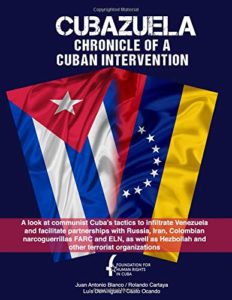 In December 2007, after Venezuela’s Hugo Chavez suffered his first defeat at the polls, Cuba’s Communist regime instructed him on how to hang on to power as long as Fidel Castro himself had, resulting in two agreements, recently reviewed by Reuters:
In December 2007, after Venezuela’s Hugo Chavez suffered his first defeat at the polls, Cuba’s Communist regime instructed him on how to hang on to power as long as Fidel Castro himself had, resulting in two agreements, recently reviewed by Reuters:
The agreements, specifics of which are reported here for the first time, led to the imposing of strict surveillance of Venezuelan troops through a Venezuelan intelligence service now known as the Directorate General of Military Counterintelligence, or DGCIM. Under Cuban military advisors, Venezuela refashioned the intelligence unit into a service that spies on its own armed forces, instilling fear and paranoia and quashing dissent.
Now known for its repressive tactics, the DGCIM is accused by soldiers, opposition lawmakers, human rights groups and many foreign governments of abuses including torture and the recent death of a detained Navy captain. According to the documents reviewed by Reuters, the agreements, signed in May 2008, allowed Cuba’s armed forces to:
• Train soldiers in Venezuela
• Review and restructure parts of the Venezuelan military
• Train Venezuelan intelligence agents in Havana
• And change the intelligence service’s mission from spying on foreign rivals to surveilling the country’s own soldiers, officers, and even senior commanders.
“The most important mission for the intelligence service once was to neutralize any threat to democracy,” said Raul Salazar, a former defense minister under Chavez who opposes Maduro. “Now, with Cuba in charge, the government uses it to stay in power.”
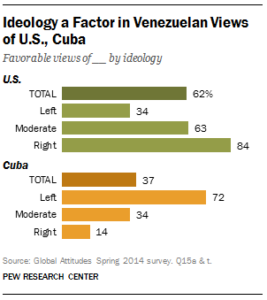 Yet 57% of Venezuelans give Cuba an unfavorable rating, with fully 38% saying they have a very unfavorable impression of their trade partner. Only 37% have a favorable outlook, according to a 2014 Pew Research Center poll.
Yet 57% of Venezuelans give Cuba an unfavorable rating, with fully 38% saying they have a very unfavorable impression of their trade partner. Only 37% have a favorable outlook, according to a 2014 Pew Research Center poll.
It was a bold move by Cuba’s Castro dictatorship to colonize Venezuela, a much larger country with infinitely more natural resources. But as the tragedy in Venezuela unfolds, it appears the Cuban dictatorship may have bitten off more than it can chew, Juan Antonio Blanco writes in Diario de Cuba.
Blanco’s Cubazuela: Chronicle of a Cuban Intervention (above) proves that Cuba “acts as a de facto occupying force, coopting every relevant institution and controlling the strategic decision-making process of the Venezuelan regime,” said Hugo Achá, Human Rights lawyer and Director of Research for the Foundation for Human Rights in Cuba.
The United Nations Human Rights Council should establish a commission of inquiry during its September 2019 session to investigate serious human rights violations in Venezuela, Human Rights Watch said in a joint document prepared by 11 Venezuelan and international human rights organizations.
The UN high commissioner for human rights, Michelle Bachelet, is scheduled to present an oral update on the human rights situation in Venezuela before the UN Human Rights Council on September 10, following a damning report published by her office in July.
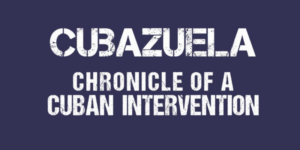 “The victims of the dire human rights and humanitarian crisis in Venezuela deserve a thorough and authoritative response from the Human Rights Council to address their right to truth, justice, and reparations,” said José Miguel Vivanco, Americas director at Human Rights Watch.
“The victims of the dire human rights and humanitarian crisis in Venezuela deserve a thorough and authoritative response from the Human Rights Council to address their right to truth, justice, and reparations,” said José Miguel Vivanco, Americas director at Human Rights Watch.
Canada’s Foreign Minister Chrystia Freeland said on Thursday she would go to Cuba next week to speak with her counterpart there, Bruno Rodriguez, about ending the political and humanitarian crisis in Venezuela and returning it to democracy, The Times adds:
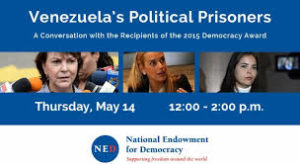 It would mark Freeland’s third meeting with Rodriguez since May on the issue. Cuba is a strong ally of President Nicolas Maduro, whom most Western nations want to step down in favor of opposition leader Juan Guaido.
It would mark Freeland’s third meeting with Rodriguez since May on the issue. Cuba is a strong ally of President Nicolas Maduro, whom most Western nations want to step down in favor of opposition leader Juan Guaido.
“It is important to explore all possible paths to a resolution of the situation,” Freeland said during a joint press conference with U.S. Secretary of State Mike Pompeo in Ottawa.
Reports that there had been talks between Cabello and Trump officials are “a very positive sign”, said Geoff Ramsey, a Venezuela expert at the Washington Office on Latin America.
“It suggests an understanding at the top level of [Maduro’s] government that this is unsustainable,” he said of Venezuela’s ongoing economic, political and humanitarian meltdown.
“I think what these people are looking for is some kind of guarantee [from the US] that they are not going to end up in a jail cell in Miami,” Ramsey added.
*A former Latin America program officer at the National Endowment for Democracy.







